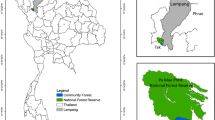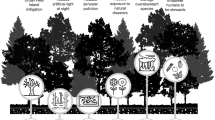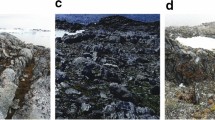Abstract
Natural fires represent a frequent and widespread disturbance in many environments around the world and consequently plays important roles on ecosystem dynamics. The goal of our study was to evaluate the short-term effects of fire on termites in a tropical mountain ecosystem of the Brazilian Cerrado (savanna). Termites were sampled in unburned and burned areas 2 weeks after an extensive fire event. Sampling method consisted of toilet paper baits placed at three elevations: 800 m (Cerrado woodland habitat), 1100 and 1400 m (campo rupestre vegetation type). A total of 19 termite species were sampled, of which 15 occurred at 800 m, eight at 1100 m, and two at 1400 m. Average termite species richness and bait colonization were lower at 1400 m compared with the other elevations, which did not differ from each other. No effect of fire on average species richness and bait colonization was found for any elevation. As termites are known to be strongly affected by climate, soil, and vegetation, termite assemblages are probably being filtered physiologically by environmental conditions along the elevation gradient. The high tolerance of termites to fire effects is likely associated with the strategy of many collected species in constructing hard clay mounds, either above or below ground, or taking shelter in mounds built by other termite species to escape fire. We conclude that while termites are sensitive to environmental changes in conditions along the elevation gradient, they are also highly tolerant to fire in this tropical mountain.



Similar content being viewed by others
Data availability statement
Data are available on request from the authors.
References
Abensperg-Traun M, Milewski AV (1995) Abundance and diversity of termites (Isoptera) in imburnt versus burnt vegetation at the Barrens in Mediterranean Western Australia. Austral Ecol 20:413–417. https://doi.org/10.1111/j.1442-9993.1995.tb00557.x
Alvarado ST, Fornazari T, Cóstola A et al (2017) Drivers of fire occurrence in a mountainous Brazilian cerrado savanna: tracking long-term fire regimes using remote sensing. Ecol Indic 78:270–281. https://doi.org/10.1016/j.ecolind.2017.02.037
Avitabile SC, Nimmo DG, Bennett AF, Clarke MF (2015) Termites are resistant to the effects of fire at multiple spatial scales. PLoS ONE 10:e0140114. https://doi.org/10.1371/journal.pone.0140114
Beirão MV, Neves FS, Fernandes GW (2021) Climate and plant structure determine the spatiotemporal butterfly distribution on a tropical mountain. Biotropica 53:191–200. https://doi.org/10.1111/btp.12860
Benzie JAH (1986) The distribution, abundance, and the effects of fire on mound building termites (Trinervitermes and Cubitermes spp., Isoptera: Termitidae) in northern Guinea savanna West Africa. Oecologia 70:559–567. https://doi.org/10.1007/BF00379904
Bond WJ, Keeley JE (2005) Fire as a global ‘herbivore’: the ecology and evolution of flammable ecosystems. Trends Ecol Evol 20:387–394. https://doi.org/10.1016/j.tree.2005.04.025
Bowman DMJS, Balch JK, Artaxo P et al (2009) Fire in the earth system. Science 324:481–484. https://doi.org/10.1126/science.1163886
Constantino R (2021) Sampling methods for termites (Insecta: Blattaria: Isoptera). In: Santos JC, Fernandes GW (eds) Measuring arthropod biodiversity: a handbook of sampling methods. Springer, Cham, pp 241–255
Crawley MJ (2013) The R book. Wiley, New Jersey
Davies AB, Parr CL, Van Rensburg BJ (2010) Termites and fire: current understanding and future research directions for improved savanna conservation. Austral Ecol 35:482–486. https://doi.org/10.1111/j.1442-9993.2010.02124.x
Davies AB, Eggleton P, van Rensburg BJ, Parr CL (2012) The pyrodiversity–biodiversity hypothesis: a test with savanna termite assemblages. J Appl Ecol 49:422–430. https://doi.org/10.1111/j.1365-2664.2012.02107.x
Davies AB, van Rensburg BJ, Eggleton P, Parr CL (2013) Interactive effects of fire, rainfall, and litter quality on decomposition in savannas: frequent fire leads to contrasting effects. Ecosystems 16:866–880. https://doi.org/10.1007/s10021-013-9657-0
Dawes-Gromadzki TZ (2007) Short-term effects of low intensity fire on soil macroinvertebrate assemblages in different vegetation patch types in an Australian tropical savanna. Austral Ecol 32:663–668. https://doi.org/10.1111/j.1442-9993.2007.01752.x
de Castro FS, Da Silva PG, Solar R et al (2020) Environmental drivers of taxonomic and functional diversity of ant communities in a tropical mountain. Insect Conserv Divers 13:393–403. https://doi.org/10.1111/icad.12415
DeSouza O, Albuquerque LB, Maria V et al (2003) Effects of fire on termite generic richness in a savanna-like ecosystem ('Cerrado’) of central Brazil. Sociobiology 42:639–653
Donovan SE, Eggleton P, Bignell DE (2001) Gut content analysis and a new feeding group classification of termites. Ecol Entomol 26:356–366. https://doi.org/10.1046/j.1365-2311.2001.00342.x
Dosso K, Konaté S, Aidara D, Linsenmair KE (2010) Termite diversity and abundance across fire-induced habitat variability in a tropical moist savanna (Lamto, Central Côte d’Ivoire). J Trop Ecol 26:323–334. https://doi.org/10.1017/S0266467410000015
Elkins NZ, Sabol GV, Ward TJ, Whitford WG (1986) The influence of subterranean termites on the hydrological characteristics of a Chihuahuan desert ecosystem. Oecologia 68:521–528. https://doi.org/10.1007/BF00378766
Fernandes GW (ed) (2016) Ecology and conservation of mountaintop grasslands in Brazil. Springer, Cham
Fernandes GW, Almeida HA, Nunes CA et al (2016a) Cerrado to rupestrian grasslands: patterns of species distribution and the forces shaping them along an altitudinal gradient. In: Fernandes GW (ed) Ecology and conservation of mountaintop grasslands in Brazil. Springer, Cham, pp 345–378
Fernandes GW, Pedroni F, Sanchez M et al (2016b) Cerrado: em busca de soluções sustentáveis. EditoraVozes, Rio de Janeiro
Fernandes GW, Murcia SL, Santos JC et al (2018) Termite foraging on plants of a Brazilian savanna: the effects of tree height. Sociobiology 65:48–58. https://doi.org/10.13102/sociobiology.v65i1.1802
Ferrar P (1982) Termites of a South African savanna. Oecologia 52:139–146. https://doi.org/10.1007/BF00349023
Figueira JEC, Ribeiro KT, Ribeiro MC et al (2016) Fire in rupestrian grasslands: plant response and management. In: Fernandes GW (ed) Ecology and conservation of mountaintop grasslands in Brazil. Springer, Cham, pp 415–448
Gathorne-Hardy F, Syaukany EP (2001) The effects of altitude and rainfall on the composition of the termites (Isoptera) of the Leuser Ecosystem (Sumatra, Indonesia). J Trop Ecol 17:379–393. https://doi.org/10.1017/S0266467401001262
He T, Lamont BB, Pausas JG (2019) Fire as a key driver of Earth’s biodiversity. Biol Rev 94:1983–2010. https://doi.org/10.1111/brv.12544
Holt JA, Lepage M (2000) Termites and soil properties. In: Abe T, Bignell DE, Higashi M (eds) Termites: evolution, sociality, symbioses, ecology. Springer, Dordrecht
Jones CG, Lawton JH, Shachak M (1996) Organisms as ecosystem engineers. In: Samson FB, Knopf FL (eds) Ecosystem management: selected readings. Springer-Verlag, New York, pp 130–147
Jouquet P, Traoré S, Choosai C et al (2011) Influence of termites on ecosystem functioning. Ecosystem services provided by termites. Eur J Soil Biol 47:215–222. https://doi.org/10.1016/j.ejsobi.2011.05.005
Jouquet P, Bottinelli N, Shanbhag RR et al (2016) Termites: the neglected soil engineers of tropical soils. Soil Sci 181:157–165. https://doi.org/10.1097/SS.0000000000000119
Keeley JE, Pausas JG, Rundel PW et al (2011) Fire as an evolutionary pressure shaping plant traits. Trends Plant Sci 16:406–411. https://doi.org/10.1016/j.tplants.2011.04.002
Koltz AM, Burkle LA, Pressler Y et al (2018) Global change and the importance of fire for the ecology and evolution of insects. Curr Opin Insect Sci 29:110–116. https://doi.org/10.1016/j.cois.2018.07.015
Le Stradic S, Hernandez P, Fernandes GW, Buisson E (2018) Regeneration after fire in campo rupestre: Short- and long-term vegetation dynamics. Flora 238:191–200. https://doi.org/10.1016/j.flora.2016.12.001
Lenth RV (2016) Least-squares means: the R package lsmeans. J Stat Softw 69:1–33. https://doi.org/10.18637/jss.v069.i01
Monteiro I, Viana-Junior AB, de Castro Solar RR et al (2017) Disturbance-modulated symbioses in termitophily. Ecol Evol 7:10829–10838. https://doi.org/10.1002/ece3.3601
Neves FS, Lana TC, Anjos MC et al (2016) Ant community in burned and unburned sites in campos rupestres ecosystem. Sociobiology 63:628–636. https://doi.org/10.13102/sociobiology.v63i1.779
Ngwenya BT, Ndagurwa HGT, Huruba R et al (2021) The coupling effects of pyrodiversity and land use on termite assemblages in semi-arid savanna. Glob Ecol Conserv 28:e01643. https://doi.org/10.1016/j.gecco.2021.e01643
Nunes CA, Braga RF, Figueira JEC et al (2016) Dung beetles along a tropical altitudinal gradient: environmental filtering on taxonomic and functional diversity. PLoS ONE 11:e0157442. https://doi.org/10.1371/journal.pone.0157442
Nunes CA, Quintino AV, Constantino R et al (2017) Patterns of taxonomic and functional diversity of termites along a tropical elevational gradient. Biotropica 49:186–194. https://doi.org/10.1111/btp.12365
Nunes CA, Beiroz W, da Silva PG et al (2019) Fire? They don’t give a dung! The resilience of dung beetles to fire in a tropical savanna. Ecol Entomol 44:315–323. https://doi.org/10.1111/een.12705
Oliveira-Filho AT, Ratter JA (2002) Vegetation physiognomies and woody flora of the Cerrado biome. In: Oliveira PS, Marquis RJ (eds) The cerrados of Brazil: ecology and natural history of a neotropical savanna. Columbia University Press, New York, pp 91–120
Palin OF, Eggleton P, Malhi Y et al (2011) Termite diversity along an Amazon-Andes elevation gradient, Peru. Biotropica 43:100–107. https://doi.org/10.1111/j.1744-7429.2010.00650.x
Pausas JG (2019) Generalized fire response strategies in plants and animals. Oikos 128:147–153. https://doi.org/10.1111/oik.05907
Pausas JG, Keeley JE (2019) Wildfires as an ecosystem service. Front Ecol Environ 17:289–295. https://doi.org/10.1002/fee.2044
Pausas JG, Parr CL (2018) Towards an understanding of the evolutionary role of fire in animals. Evol Ecol 32:113–125. https://doi.org/10.1007/s10682-018-9927-6
Peterson C (2010) Review of termite forest ecology and opportunities to investigate the relationship of termites to fire. Sociobiology 56:313–352
Pires ACV, Barbosa M, Beiroz W et al (2020) Altitudinal variation in butterfly community associated with climate and vegetation. An Acad Bras Cienc 92:1–13. https://doi.org/10.1590/0001-3765202020190058
R Core Team (2021) R: a language and environment for statistical computing. Foundation for Statistical Computing, Vienna
Silveira FAO, Negreiros D, Barbosa NPU et al (2016) Ecology and evolution of plant diversity in the endangered campo rupestre: a neglected conservation priority. Plant Soil 403:129–152. https://doi.org/10.1007/s11104-015-2637-8
Silveira FAO, Barbosa M, Beiroz W et al (2019) Tropical mountains as natural laboratories to study global changes: A long-term ecological research project in a megadiverse biodiversity hotspot. Perspect Plant Ecol Evol Syst 38:64–73. https://doi.org/10.1016/j.ppees.2019.04.001
Simon MF, Pennington T (2012) Evidence for adaptation to fire regimes in the tropical savannas of the Brazilian Cerrado. Int J Plant Sci 173:711–723. https://doi.org/10.1086/665973
Souza RF, Anjos DV, Carvalho R, Del-Claro K (2015) Availability of food and nesting-sites as regulatory mechanisms for the recovery of ant diversity after fire disturbance. Sociobiology 62:1–9. https://doi.org/10.13102/sociobiology.v62i1.1-9
Teixeira J, Souza L, Le Stradic S, Fidelis A (2022) Fire promotes functional plant diversity and modifies soil carbon dynamics in tropical savanna. Sci Total Environ 812:152317. https://doi.org/10.1016/j.scitotenv.2021.152317
Vasconcelos HL, Pacheco R, Silva RC, Vasconcelos PB, Lopes CT, Costa AN, Bruna EM (2009) Dynamics of the leaf-litter arthropod fauna following fire in a neotropical woodland savanna. PLoS ONE 4:e7762. https://doi.org/10.1371/journal.pone.0007762
Vasconcelos HL, Maravalhas JB, Cornelissen T (2017) Effects of fire disturbance on ant abundance and diversity: a global meta-analysis. Biodivers Conserv 26:177–188. https://doi.org/10.1007/s10531-016-1234-3
Acknowledgements
We thank T. Ferreira, T. Grego, M. Bruschi, A.P. Leon, and I. Avelar for help in the field. We thank the Brazilian National Council for Scientific and Technological Development (CNPq) for funding this project as part of Long-Term Ecological Research (PELD-CRSC-17); and the Research Support Foundation of Minas Gerais State (FAPEMIG) for financial support. We are also grateful to Cedro Têxtil, Reserva Vellozia, and Parque Nacional da Serra do Cipó for logistical support. GWF thanks CNPq and Fapemig for grant support. N. Matías-Ferrer (INECOL) helped with reviews of previous drafts.
Author information
Authors and Affiliations
Contributions
GWF, YO, DN, SN designed study, SN and YO conducted study, RC identified termite species, SN analyzed the data and wrote the paper, and GWF, YO, DN and RC reviewed and edited the paper.
Corresponding author
Ethics declarations
Conflict of interest
The authors declare that they have no conflict of interest.
Supplementary Information
Below is the link to the electronic supplementary material.
Rights and permissions
Springer Nature or its licensor (e.g. a society or other partner) holds exclusive rights to this article under a publishing agreement with the author(s) or other rightsholder(s); author self-archiving of the accepted manuscript version of this article is solely governed by the terms of such publishing agreement and applicable law.
About this article
Cite this article
Fernandes, G.W., Oki, Y., Negreiros, D. et al. No short-term effects of fire on termite diversity in a tropical mountain. Insect. Soc. 70, 203–211 (2023). https://doi.org/10.1007/s00040-023-00909-4
Received:
Revised:
Accepted:
Published:
Issue Date:
DOI: https://doi.org/10.1007/s00040-023-00909-4




